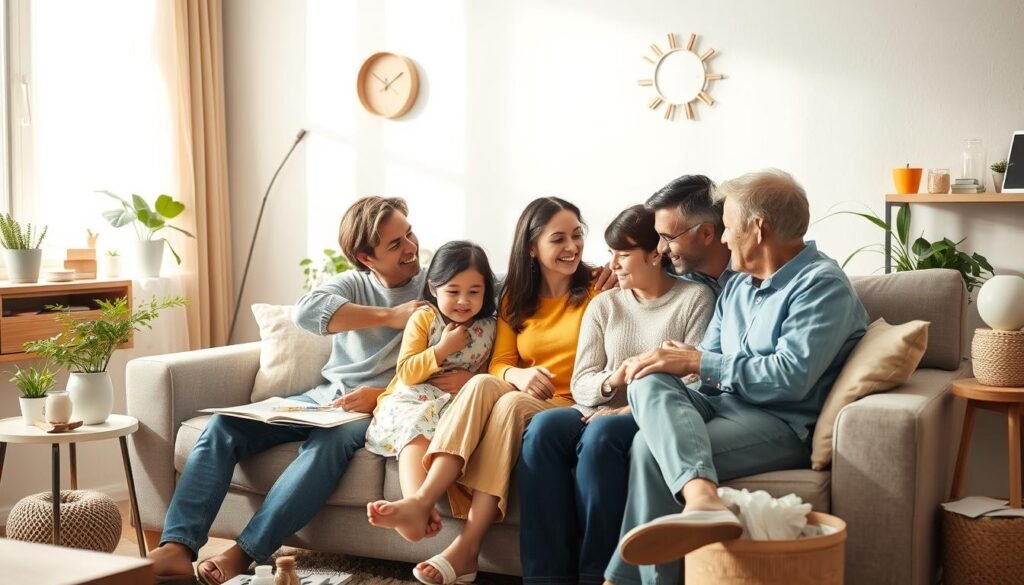Did you know about 30% of people with mental health conditions get help with their families in therapy? This shows how vital families are in helping their loved ones heal, especially with depression. Family therapy is key for those fighting depression, helping not just the individual, but their family members too. It tackles problems between family members and makes communication better, offering strong mental health support. This can greatly lower feelings of being alone.
Family therapy helps families grow closer and support each other more. Studies show that having family involved can cut depressive symptoms by half. By improving relationships through therapy, everyone’s emotional health gets better – not just the person with depression.
Key Takeaways
- Family therapy can be beneficial for various mental health conditions, including depression.
- About 30% of individuals with mental health issues involve family members in therapy sessions.
- Involvement of family members can lead to a 50% reduction in depressive symptoms.
- Family therapy improves communication and conflict resolution skills for about 70% of families.
- Research shows positive outcomes for families dealing with trauma through family therapy.
The Impact of Depression on Families
Depression affects not only individuals but families too. In America, about 21 million adults and five million teens face depression each year. This issue impacts how families function.
Understanding Major Depression
Major Depression is a severe mental health issue. It brings intense sadness and a lack of interest in life. Those affected and their families face challenges, risking burnout and emotional stress. Family members often feel overwhelmed by the emotional upheaval.
Interpersonal Problems Related to Depression
Depression can cause communication issues in families. Family members may find it hard to understand one another. The input from family is sometimes overlooked by professionals, causing caregiver frustration. Children growing up with a depressed parent may have mental health struggles, showing more behavioral problems.
| Impact on Family Members | Symptoms and Issues |
|---|---|
| Increased risk of burnout | Emotional exhaustion and stress |
| Parental neglect of other children | Feelings of resentment within the family |
| Financial strain | Economic burdens from treatment costs |
| Coping with sleeplessness | Health problems linked to caregiver stress |
Support from others is crucial for families facing depression. When families get involved in treatment, it helps everyone. It’s important to intervene early and consider family therapy. This approach can improve the well-being of both individuals and their families.
What is Family Therapy?
Family therapy is a type of counseling that improves family relationships. It focuses on how family members interact. This method is key for dealing with depression. The Family Therapy Definition shows its importance in solving family problems caused by mental health issues. It helps by looking at family interactions, making everyone’s mental health better.
Defining Family Therapy in a Mental Health Context
Family therapy is crucial for tackling depression’s deep impact. Those suffering from depression feel isolated and worthless. These feelings can affect the whole family. Family Counseling changes unhealthy patterns and makes family bonds stronger. It involves everyone in the family to improve communication and mend broken relationships. It offers the support needed in hard times.
The Goals of Family Therapy
The main Therapy Goals are creating supportive environments for open expression. Families learn to build a healthy support network. They gain skills to deal with the guilt and helplessness tied to mental illness. Therapy might be together or separate, fitting the family’s needs. Family therapy strengthens families, helping them face challenges and boosting wellbeing.
The Efficacy of Family Therapy for Depression Treatment
Family therapy is being looked at to help with depression. Researchers have noticed it can make family dynamics better. But, how well it works for major depression varies.
Comparing it to individual therapy shows what’s good and what’s lacking about it.
Evidence from Recent Studies
A study looked at 60 teenagers, most of whom were girls. They were between 13-18 years old. The study found mixed results.
Using the Hamilton Depression Scale, 5% got better with Attachment-Based Family Therapy. Only 3.33% improved with usual treatment. Family Therapy Efficacy showed that 63.3% still had depression symptoms after 16 weeks.
Even though family therapy had promise, it wasn’t better than the usual treatment. Self-reports on the Beck Depression Inventory-II showed no big changes between groups. This tells us treating depression is hard and we need to keep improving how we do it.
Comparative Effectiveness versus Other Treatments
Looking at family therapy against things like cognitive behavioral therapy (CBT) shows interesting details. CBT is great at managing depression by fixing negative thoughts. Adding medicine to psychotherapy often works well too.
The American Association for Marriage and Family Therapy (AAMFT) says we should check all treatments carefully. They believe in working together to get the best results. Family therapy doesn’t always beat single-person therapy, but it’s very important. It supports the whole person in a unique way.
| Study Group | Clinician-Rated Remission Rate | Self-Reported Symptoms | Percentage of Clinical Range after Treatment |
|---|---|---|---|
| ABFT | 5% | No significant difference | 63.3% |
| TAU | 3.33% | No significant difference | 63.3% |
How Family Counseling Supports Emotional Wellbeing
Family counseling is key in improving emotional health, especially for those with depression. It creates a space where families can openly talk about their issues. Open dialogue helps in tackling the challenges that come with mental health problems. With good communication, families feel less stressed and can better manage tough situations.
Encouraging Open Communication
Successful family counseling relies on open communication. It allows everyone to share their feelings without fear. This can reduce feelings of being alone and powerless. Families that talk openly are more supportive in the healing process. According to the Family Counseling Impact study, this leads to better following of treatment plans.
Addressing Relationship Dynamics in Therapy
Family counseling looks deep into relationships. It identifies harmful behaviors that might cause stress. Using different therapy techniques, it teaches families how to relate better. This supports not just emotional, but also practical needs of those recovering. It encourages a supportive and responsible family environment.
| Support Type | Description | Benefits |
|---|---|---|
| Emotional Support | Understanding and empathy from family members | Reduces feelings of isolation |
| Practical Support | Assistance with daily activities | Allows focus on recovery |
| Informational Support | Sharing educational resources about mental health | Empowers informed decision-making |
| Communication Skills | Improving dialogue among family members | Enhances relationship dynamics |

The Role of Cognitive Behavioral Therapy in Family Settings
Cognitive Behavioral Therapy (CBT) is key in tackling mental health issues within families. It looks at how thoughts, feelings, and actions are linked. This therapy helps families understand their own interactions and how they deal with depression. By combining CBT with Family Therapy, families can work together to find ways to cope better.
Integrating CBT with Family Therapy Approaches
When CBT is used in family therapy, the results are stronger. Families learn to spot and change negative thinking patterns that cause emotional pain. They see how each person’s actions affect everyone else. Plus, they get better at talking things out, helping them handle stress and disagreements more positively. Studies prove that adding CBT to family therapy makes a real difference in mental wellness.
Success Stories and Case Studies
Many families have seen big improvements by using CBT with Family Therapy. They talk about feeling less depressed and getting along better. For example, some stories reveal how CBT helped them communicate better and understand each other’s feelings and roles. These experiences show how powerful combining these therapies can be for families struggling with depression. It shows how changing negative thoughts can lead to emotional healing.
| Contribution Type | Percentage of Total Articles | Notes |
|---|---|---|
| Review Articles | 45% | Focus on biopsychosocial medicine |
| Clinical Trials | 15% | Includes 45 randomized controlled trials |
| CBT Effectiveness | Medium Effect Size (d = .67) | Effective for anxiety, depression, behavioral issues |
| Comorbidity and Risk | High | High rates in depressed individuals |
| Lifetime Prevalence of Clinical Depression | 16.2% | Significant public health concern |
This therapy blend helps families accept and support each other, moving towards a healthier mental state. For more info on how thoughts and feelings connect to mental health, check this resource.
Holistic Healing Through Family Therapy
A holistic approach in family therapy focuses on treating the whole person within their family environment. This method sees the connections between mind and body health. It’s great for tackling mental health problems. By blending medical and therapeutic strategies, family therapy brings benefits to everyone involved.
The Benefits of a Holistic Approach
The holistic model improves family bonds by creating a supportive atmosphere. It gets families to work together on emotional issues. This leads to better talking and stronger relationships among members. Major benefits are:
- Strengthened emotional resilience among family members
- Enhanced understanding of personal and shared experiences
- Improved coping mechanisms for managing stress and anxiety
Combining Medical and Psychological Support
Mixing medical treatments with family therapy helps the healing journey. This approach covers all mental health needs well. About 70-80% of families in such programs see better functioning and fewer mental health issues. Taking care of emotional and medical needs leads to total wellbeing. This makes holistic healing super important for families tackling problems together.

Exploring Interpersonal Connections in Family Therapy
Family therapy is key for growing closer within the family. It’s important for emotional and mental health support. By talking and using different methods, families strengthen trust, empathy, and understanding.
Building Stronger Family Bonds
Family therapy focuses on through communication and emotional support. Each meeting is about an hour, perfect for discussing shared life events. Research shows it boosts problem-solving and helps set boundaries. This helps all kinds of families, even those not related by blood. By meeting weekly, families create a supportive space that aids recovery.
Reducing Family Conflict
Family therapy aims to solve conflicts, reducing stress. Studies show it improves how families handle disagreements with good communication skills. Using approaches like CBT and DBT helps with financial and mental health problems. It’s very helpful for families going through tough times like divorce or dealing with substance abuse. Focusing on connections and solving conflicts makes families healthier and happier.
| Benefits of Family Therapy | Details |
|---|---|
| Duration | Typically lasts around 60 minutes per session |
| Frequency | Generally involves once-a-week sessions |
| Short-term Treatment | Usually encompasses around 12 sessions |
| Resource Accessibility | Accessible for families beyond blood relationships |
| Communication Skills | Improves communication and establishes healthy boundaries |
| Problem-solving | Enhances collective problem-solving abilities |
| Conflict Resolution | High effectiveness in addressing and reducing family conflicts |
Techniques in Therapeutic Communication
Therapeutic communication is key in family therapy, especially for those with depression. Using effective strategies helps create a space where feelings can be shared. This leads to better support and understanding. Skills like active listening, empathy, and reflective feedback build trust in the therapeutic relationship.
Effective Communication Strategies
Effective communication strategies play a vital role in the success of family therapy. Important techniques include:
- Active Listening: Being fully present and engaged, allowing clients to share freely.
- Empathy: Showing understanding and compassion makes family members feel heard and valued.
- Offering Hope: It’s crucial to uplift those in challenging times with reassurance and hope.
- Seeking Clarification: Asking questions to understand better helps address complex feelings.
- Using Silence: Moments of silence can provide space for reflection and deeper thought.
Integrating these strategies into practice improves interaction quality and promotes client well-being. Nursing programs emphasize these tactics, highlighting their value in clinical therapeutic communication.
The Importance of Listening in Therapy
Listening is the foundation of effective therapeutic communication. Active listening boosts understanding and strengthens the therapy relationship. This is key for successful outcomes. Being heard can significantly improve mental health for individuals with depression.
Patient experiences show the positive impact of listening. In therapy, patients feel empowered and understood. Active listening and sharing observations create a supportive environment. This encourages positive change. Therapeutic communication also fosters ongoing dialogue and stronger family bonds.

Using therapeutic communication tactics benefits both individual and families facing mental health issues. By focusing on these skills, therapists encourage healthier interactions. This supports a nurturing family environment.
| Technique | Description | Impact on Therapy |
|---|---|---|
| Active Listening | Fully engaging and paying attention to the client. | Improves trust and rapport. |
| Empathy | Understanding and sharing feelings with others. | Deepens emotional connections. |
| Offering Hope | Encouraging positivity and recovery. | Increases motivation in therapy. |
| Seeking Clarification | Asking questions for clearer understanding. | Clears up misunderstands, enriches conversation. |
| Using Silence | Quiet moments for reflection. | Promotes deeper thought and processing. |
Family Therapy as a Support for Depressed Individuals
Adding family support to depression treatment can really help someone get better. It makes people with depression feel less alone. This kind of support is very important during recovery and leads to better health.
Why Involve Family in Treatment
Having family in treatment helps everyone understand and work together. Families play a big role in helping a person with depression. Family support can lead to:
- Improved Communication: It encourages everyone to talk openly, sharing feelings and worries.
- Enhanced Support: Family members offer comfort, reducing feelings of solitude and sadness.
- Shared Learning: In therapy, families learn how to cope better, making them stronger for any future problems.
Creating a Supportive Environment
A supportive environment is key for anyone in depression treatment. Family therapy offers a place where everyone feels safe to share their thoughts. By taking part in family therapy, people find:
- Strengthened Relationships: It helps improve family bonds that might have been hurt by mental health issues.
- Collective Healing: Families heal together, learning to face difficulties and support one another emotionally and mentally.
- Increased Motivation: Having family support encourages more active participation in recovery.
Conclusion
Family therapy plays a key role in helping those with depression. Today, around 100 million people worldwide struggle with this illness daily. It’s one of the top causes of death globally. So, having strong support systems is vital.
Bringing families into therapy can improve outcomes for the person affected. It also helps the whole family’s wellbeing. This approach tackles depression from every angle.
Studies show family therapy helps with individual symptoms and family relations. Though more research is needed, it’s clear it works better than no treatment. Since depression often comes back, supporting each other in the family is crucial.
Now, with online options, family therapy is easier to access. This means families can get help from anywhere, which is especially useful nowadays. Virtual therapy can be just as good as meeting in person.
In conclusion, we should keep improving family therapy methods. It’s key to supporting those with depression and their families. This way, we build stronger, healthier relationships.